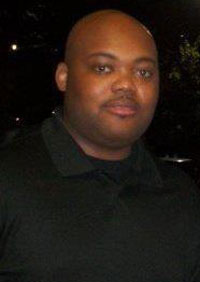Recidivism research secures scholar spot in top program
When UALR criminal justice major Malcolm Scott first heard about the rising rates of recidivism among African-American males, he was so shocked he decided to verify his professor’s information on his own.
“I heard 80 percent, and I just thought to myself, ‘That can’t be right,’” Scott said. “Unfortunately, I found out it was true.”
Not content to simply acknowledge the problem, Scott, a McNair Scholar and May 2013 UALR graduate, is now on a mission to come up with a solution.
Much of Scott’s undergraduate research focus has been on trying to better understand some of the underlying causes of the high recidivism rates among the roughly 1 million African-American men incarcerated in the U.S. penal system.
The issue hits close to home for Scott. Of the 10 males who grew up with Scott in the small town of Wabbaseka in Jefferson County, only one other besides him has avoided either incarceration or death.
Shortly after high school, Scott worked at the Tucker Maximum Security Unit near Pine Bluff to help support his family. There he got a close-up view of death row inmates.
Scott’s background in corrections eventually landed him in the security division of the Little Rock financial services firm Stephens Inc., where he was encouraged to work a flexible schedule so he could finally finish his degree.
As an undergraduate, Scott discovered in his research the important role family members play in recidivism: 40 percent of former inmates will not regress into criminal behavior if the family is intensely involved in the prisoner’s re-entry to society.
Scott has presented his findings at criminal justice conferences from Atlanta to Houston, and he recently received a certificate of appreciation from Little Rock’s Community Based Re-entry Initiative for his efforts.
UALR’s Department of Criminal Justice also recognized Scott with its annual Undergraduate Student of the Year award during its recent honor convocation.
“He really represents the type of person our department is about,” said Dr. David Montague, Scott’s advisor. “I cannot say enough about him. He handles himself with integrity and competence.”
Scott’s post-baccalaureate plans now include graduate school at University of Missouri-St. Louis, one of the top criminal justice programs in the country.
After that?
“I am coming back to Arkansas and implementing what I hope to learn from the best scholars,” he said.
“If we don’t set our standards high, then who will? I hope in my lifetime maybe we can make a tremendous difference.”
